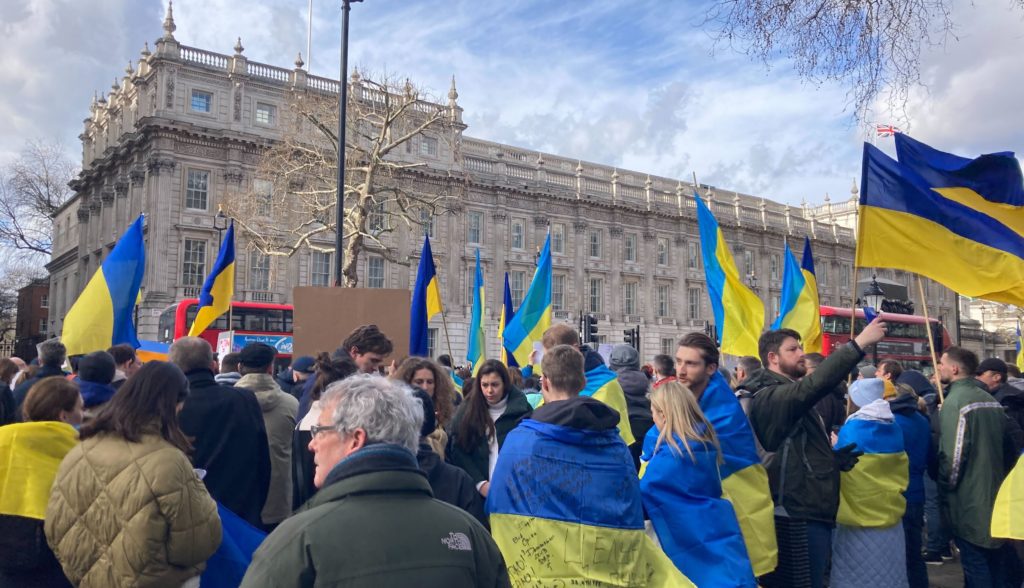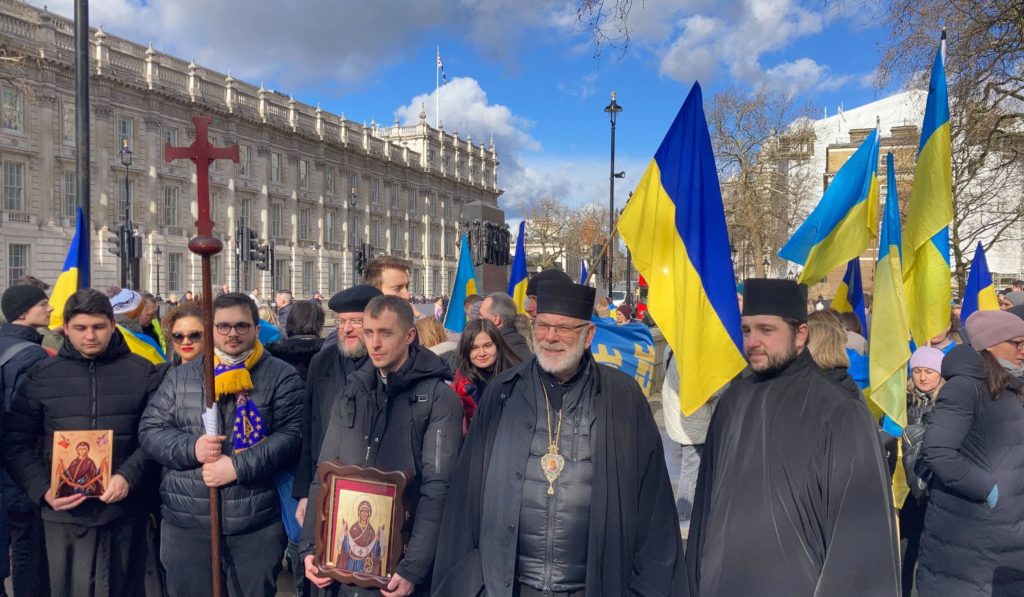London, UK
Every Ukrainian in London has the same story to tell. Hundreds of them are gathering outside Ten Downing Street to demand an end to the war that started in their country this morning.
It’s supposed to be a demonstration, but it looks like a vigil. Generally, the men are furious and tight in the jaw. The women are all crying. There is a physical sadness and uncertainty hovering over the crowd. Nobody has slept.
And they all tell the same story. Everybody’s family is in danger, but nobody’s family will leave Ukraine.
“I woke up my mum sending me a message saying that the Russians are bombing everywhere”, says Paulina, 24. Her family lives near the old line of control in the east of the country. “I don’t know what will happen. I feel so much hatred right now…” Paulina is crying.
“My grandmother is housebound, and my mother won’t leave. She would never leave her two cats behind.”

Every other person is holding an improvised placard. You wake up to attack helicopters buzzing over your country and all you can do is make placards. “FULL HELP”, says one. “SayNOToPutin”, says another.
A woman moves around taking donations for the Ukrainian army into a cardboard box. Flags, so yellow and so blue, are wrapped around people’s shoulders like armour. Flags for a country that may not exist in a month’s time.
Nazarii is 27 and he was a soldier once. He fought in the Donbas. “For now it’s important not to panic. We have a strong army.” It feels important for him to say this. He talks to convince himself, though he is as white as a ping pong ball. “For now, we have to stay and believe in our army.”
He moves away and joins a chant: “Glory to Ukraine. Glory to the heroes.”
I watch Kenneth Nowakowski, the bishop of the Ukrainian Orthodox Church in London, speak to a journalist. “…a day that we’ve all been praying we will never see.” Around him are priests in their clerical black, holding icons and crucifixes.

Anastasiya has lived in London for five years. Her entire family is in Dnipro. When she talks about them, she cries. “They are hiding in the basement. There were missiles hitting my city this morning. My family doesn’t know what to do. There is not enough information. They have nowhere to go.”
Nobody expected it to happen like this. Weeks before Anastasiya had asked them whether now was the right moment to evacuate her little sister to Poland, or the UK. Her parents didn’t think Putin was serious. “My family won’t ever leave”, she says. “There is nowhere for them other than their homes.”
It is a demonstration, so there must be speeches. They are strong but the microphones are weak. The words struggle against the February gust. A woman in a black puffer jacket says that Ukraine is fighting for democracy, for human dignity. Union Jacks are handed out amongst the crowd, which keeps growing.
To the other side of the street, where tourists walk by the Prime Minister’s residence, this is another London spectacle. Like influencers posing by red telephone boxes, or the pelicans in St James’s Park. Spring is arriving, the pandemic is over, and the price of an Uber is almost back to normal. As I walk away, I think about a line from one of the speeches.
“When the last Ukrainian soldier falls. Putin will come for you.”







Join the discussion
Join like minded readers that support our journalism by becoming a paid subscriber
To join the discussion in the comments, become a paid subscriber.
Join like minded readers that support our journalism, read unlimited articles and enjoy other subscriber-only benefits.
SubscribeThe UK is unable/unwilling to protect its own borders. If they care so little for our own borders, why are they fussing about the borders in another country?
Putin may be a thug. But, he’s also a serious man who loves his own country.
Whereas we are governed by dilettantes who sneer at our own traditions and people.
It’s not the Russians who are tearing down statues, removing artwork, cancelling literature and enacting discriminatory legislation against white heterosexual males such as myself.
So why should I care?
Why should you care? John Donne explains in For Whom the Bell Tolls.
“No man is an island,
Entire of itself.
Each is a piece of the continent,
A part of the main.
If a clod be washed away by the sea,
Europe is the less.
As well as if a promontory were.
As well as if a manor of thine own
Or of thine friend’s were.
Each man’s death diminishes me,
For I am involved in mankind.
Therefore, send not to know
For whom the bell tolls,
It tolls for thee.
John Donne”
The Elizabethan metaphysical Poet…..
I suppose modern thinking is supposedly (but falsely) on this track, all one people on one world…… but that is false. In reality modern thinking is everyone is alone, intersectionality breaks us into separate identities where no collective exists – no Nation, no mutual society, just each individual alone.
I was married to a Ukrainian woman, now deceased – they did not like the Russians at all – a hard people, but intensely patriotic. The reason I ended up marrying her (actually I was paid to marry her through an odd set of circumstances – but that was not really why I did..) I married her because she was the first woman I had met who was hard enough to live the life I was living at the time, I have not met a woman tougher I can recall. Over the years she broke my nose, my ribs, cut me badly once, and I remember fondly the time she pulled a knife on some tough back in the woods – and how he backed right down….. Old times, I miss her a lot – I would marry another Ukrainian if had the chance….
‘Putin may be a thug. But, he’s also a serious man who loves his own country”.
The same could be said of Hitler, so what’s your point?
Tories doing the bidding of the Globalist American Empire as usual. His master’s voice indeed.
You should care because if good people do nothing, evil will triumph
So maybe you ought to ask Putin to be PM?
Nothing you say makes much more sense.
Europe is broken and Nato is defunct.
Sanctions are a fantasy. Why does Russia need Europe? They can get their raw materials from the Third World. Where is Europe going to get its gas? They have to buy it from Russia.
China can and likely will step in to provide technical products since it will herald a shift in global power in its favour.
Putin’s bluff has shown the West for what it is – a spineless bunch of woke idiots living in a fantasy world that nobody else inhabits.
EU leaders, hopefully this brush with reality will remind you that, whatever the EU’s evils are, the privileges and rights of the tortured minorities your world revolves around, are a lot better there than anywhere else in the world.
I was just reading of the Sanctions Biden is pushing, and Boris…
If Russia is locked out of SWIFT (bank transferring) then it will hurt them – but I worry it will end up hurting the USA $’s Reserve Currency System even more, and the Reserve Currency $ is how USA lives on debt, as the USA $, and so our ability to spend more than we earn, is subsidized by the entire world through this Reserve mechanism.
I was a gold and silver ‘Bug’ (someone who thinks the currencies are at risk, so buying precious metals is the way to go) back at the start of the covid lockdowns – and it did nothing but moved sideways for 20 months.
The insane debt created to lockdown; paying people to not produce, but paying them to consume at normal levels – wile squandering Trillions on highly destructive Medical/Pharma products, and buying Mortgage Backed Securities and QE to keep real-estate inflating, and interest at zero, and to produce inflation to wipe out the workers savings… This kept the stock market rising to ever higher and higher record levels – wile the business produced less at greater costs…. And so Metals did nothing during this Mal-Finance time…
BUT all the wile Russia was dumping all its USA$ reserves, and buying Gold, and trading with China outside of the Reserve Currency $.
China was also buying record Gold and trying to do more trading outside the $ Reserve Currency.
Was this all in the works all this covid event? It was a Lab escapee almost definitely – it was the perfect disaster for the West to bankrupt its self and so devalue the Currencies –
This situation in Ukraine may just be coincidence, but it surely has the chance of tipping the Covid Response Self-Harmed West into a great depression. We keep stacking one Domino up behind the next one, and the next, and so on, and finally something may nudge the end one over…… and the little nudge sets off the entire chain…..
It’s an interesting observation that the most patriotic Ukrainians seem to be the ones who don’t live there anymore.
On what basis do you form that ludicrous opinion? You can see the Ukrainian people in Parliament Square, the patriotic ones in Ukraine are fighting or trying to save their lives
The “war” in Ukraine was started because Ukraine wanted the ability to join NATO but I heard this morning that the Ukraine President had been in contact with EU countries to ask if they would support Ukraine’s application for NATO membership and not one of them would agree to do that.
If that had been made clear at the outset then meaningful negotiations would have taken place.. The Ukraine President is now talking about Ukraine being neutral BUTTHAT WAS WHAT RUSSIA WANTED AT THE OUTSET.
As a result of this “misunderstanding”, fuel prices have soured even higher for those in the UK who have difficulty in making ends meet and businesses which have had a mutually beneficial relationship with Russia (and Ukraine) have had that business curtailed.
Did anyone else hear this?.
Yes, I heard it 8 years ago.
But no Ukrainian leader could renounce accession to NATO. Meanwhile, European nations have been saying that accession wont be anytime soon for the last 8 years.
Better buckle up, though, this war is going to last for some time.
That raft of conversations has been going on for many years and has been well covered in the media!
It may have been talked about, but it is of particular significance now because the Ukrainian President has dug himself into a hole with his country in turmoil
Le’ts hope he emerges safe from his hole having driven off the Russian invaders and murderers